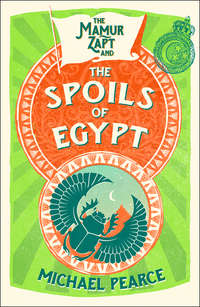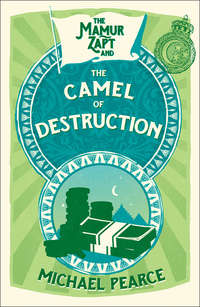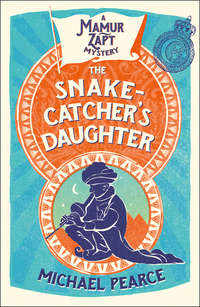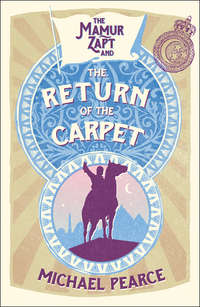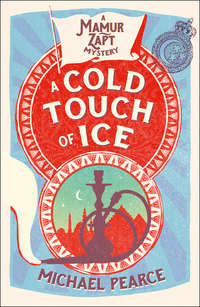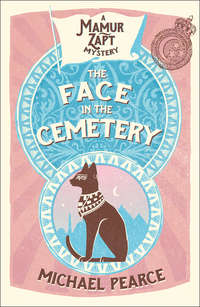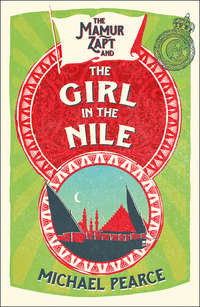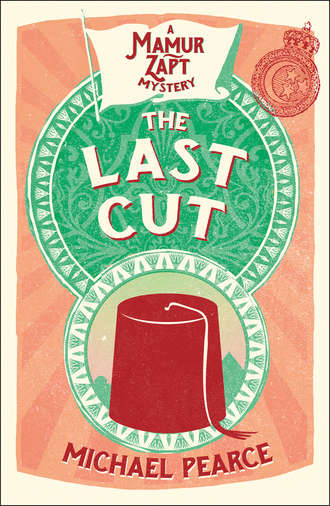
Полная версия
The Last Cut
‘Nothing, Effendi. The night was dark. But shortly I heard shouts and knew that the workmen were there. And then I heard Macrae Effendi.’
‘But you saw nothing? No man fleeing the spot, for instance?’
‘It was dark, Effendi. And, besides, he would have come through the gardens, where there are trees and bushes.’
‘There are other watchmen?’
‘There are watchmen on all the dams when the river rises. But, Effendi, they would have been watching the dams and the banks.’
‘They would have been watching against the river and not against people?’
‘That is right. What need is there to watch against people? To strike against the river is to strike against oneself.’
‘And yet last night someone did.’
‘What could have possessed them, Effendi?’ asked the watchman, shaking his head. ‘Who could do a thing like that?’
‘Some loony,’ said Macrae bitterly, now unhelmeted and slumped exhaustedly in the office. There was coffee on the table in front of them. He picked up one of the cups.
‘Inexplicable!’ said the Minister. ‘Unless –’ he looked at Owen –‘you don’t think it could have been some ridiculous Nationalist –?’
‘Politics, you mean?’ said Macrae. ‘Well, you could be right. Anyone who gets mixed up with politics has to be crazy. Especially in Egypt. Oh, sorry, Minister!’
‘Let’s not jump to conclusions!’ said Owen. ‘It could just be an individual with a grudge.’
‘Well, let’s hope you find him before he does any more damage,’ said Macrae.
‘Are you going to be able to put this right?’ the Minister asked.
‘Depends what you mean. We’ll have things more or less under control by the evening. But then we’ll need new gates.’
‘New gates?’
‘And we’ll have to set them,’ said the other engineer, the one Owen had met at the Ministry. His name was Ferguson. ‘That means that what we’re talking about really is a complete new regulator.’
‘But that will cost millions!’ said the Minister.
‘Aye,’ said Macrae.
‘We’ll have to divert the canal,’ said Ferguson.
‘Divert the canal!’
‘Aye,’ said Macrae.
‘But – but – that will –’
‘Cost more millions,’ said Ferguson.
‘We have to keep the flow going, you see,’ said Macrae. ‘And you can’t build when the water’s still going through. You have to build somewhere else. Nearby, of course.’ He looked out of the window. ‘The gardens, I should think. And then divert the water into the new channel.’
The Under-Secretary pulled himself together.
‘I’ll put it to them. It – it may take some time.’
‘Can’t wait,’ said Macrae. Ferguson nodded in agreement. ‘If you want it done before next year’s rise – and you do – you’ll have to start next month.’
‘I’ll put that to them, too,’ said the Under-Secretary, downcast.
‘But that’s not the main thing,’ said Macrae.
‘No?’ said the Under-Secretary.
‘No?’ said Ferguson, surprised.
‘No. The main thing is to get the madman who did it. Before he does it again. Owen?’
2
The world of water, on the brink of which Owen had hitherto remained, was clearly a different one from any that he had known. It seemed, for a start, to be inhabited primarily by Scotsmen. Owen put this down to the fact that it was technical. He had long established that all engineers, in the Levant at any rate, were Scottish. It must be something in the blood, he decided; which perhaps accounted for him himself having no technical competence whatsoever. He understood enough about such things, however, to know when someone was being given the technical run-around. As here, he suspected.
After the Minister had left, shell-shocked, Macrae produced a bottle of whisky and three glasses.
‘Do you like it with water or without?’
Owen hesitated.
‘Aye,’ said Macrae, ‘you’re right. It’s a big question. I take it with just a splash, myself. It releases the aromas.’
‘Aye, but that’s in Scotland,’ said Ferguson. ‘Out here, where it’s warmer, they’re released anyway.’
‘You don’t take it with ice, anyway. That’s the main thing,’ said Macrae, pouring a generous dram.
‘In the Club, perhaps. With soda. And a different whisky.’
‘My view entirely,’ said Macrae. He took a careful sip, nodded approval, and put his glass down.
‘Now,’ he said, ‘you’ll have some questions for us, I fancy.’
‘Basic facts, first,’ said Owen.
‘Aye,’ said Macrae. ‘I like facts.’
‘First: time?’
‘A couple of minutes either side of two o’clock. Ahmed phoned me at five past. I was here by twenty past.’
‘Good.’
‘Next, place. You’ll be wanting to know about that. Well,’– he looked at Ferguson for corroboration –‘I’d say bottom right-hand comer of the gates as you look towards the main barrage. About by the culvert.’
‘Aye,’ said Ferguson. ‘We’ll be able to tell you better later.’
‘What was it done with?’ asked Owen.
‘Dynamite, I fancy,’ said Macrae. ‘Where there’s dams, there’s dynamite. Have you checked the store?’ he asked Ferguson.
‘Not yet,’ said Ferguson. ‘I will.’
‘They’ll have come across the Gardens,’ said Owen. ‘I’ll take a look at those in a moment.’
‘You won’t find anything,’ said Ferguson. ‘They’re a labyrinth.’
‘I’ll look, anyway. Now I want to ask you about workmen.’
‘Workmen?’ said Macrae, surprised. ‘Why?’
‘One of them could have done it.’
Macrae and Ferguson both shook their heads.
‘Not one of ours,’ they said in unison.
‘Why not?’
‘Well –’ Macrae sat back and thought. ‘We’ve known them for years,’ he said finally. ‘Some of them worked with me down at Aswan.’
‘Even the ones who come up for the Inundation,’ said Ferguson. ‘We’ve known them for years. Every year, there they are. Really, there are too many of them. I ought to turn some away. They’re needed elsewhere in the system. But we know them and they know us.’
‘Good men,’ said Macrae.
‘What, all of them?’ said Owen.
‘Look,’ said Macrae. ‘I know what they say about Egyptian workmen. But ours are not like that.’
‘All of them?’ said Owen. ‘I’m looking for one, that’s the point.’
‘We’d have got rid of them if they were.’
‘Well, that, too, could be the point.’
‘What are you saying?’
‘I’m asking, not saying. I’m asking why anyone would want to do a thing like this. And the answer I come up with is: because they’ve got a grudge.’
‘Grudge?’ said Ferguson. ‘Who against?’
‘The Department. You.’
‘Not our workmen,’ said Macrae positively. ‘Why would they have a grudge?’
‘Because they fancied they’d been wronged. Let’s have a try. Any injuries lately?’
‘Nothing serious. It’s not construction work. It’s not like Aswan. And when there are injuries we look after them.’
‘But you do have injuries?’
‘Yes, but –’
‘I’d like the names. Next, dismissals.’
‘We don’t have any.’
‘You said yourself that if people weren’t up to the mark you got rid of them.’
‘Yes. But – Look, all that is in the past. We haven’t needed to get rid of anyone for –’
‘Years,’ filled in Ferguson.
‘What about disciplinary problems? Don’t tell me you haven’t had any of those!’
‘If we have, we’ve known how to handle them.’
‘But that’s the point: how they were handled.’
‘Look –’
‘We’ve had words,’ said Ferguson. ‘I don’t deny that. But nothing serious.’
‘Blows?’
‘I don’t believe in blows,’ said Macrae. ‘If you can’t manage without blows, you can’t manage.’
‘Fine!’ said Owen. ‘But let me have the names, will you?’
‘The Department’s got the records,’ said Ferguson.
‘In any case,’ said Macrae, ‘aren’t you barking up the wrong tree? If they had a grudge against us, wouldn’t they want to take it out on us? Not on a dam they depend on for their livelihood. The only people they’d be hurting there would be themselves!’
Out by the damaged regulator the crowds were thinning now and the carts could turn more easily. They were still coming. The long line still stretched across the gardens. It was testimony to the engineers’ capacity for getting things done that they had been able to organize so many loads in such a short space of time.
The loads, inevitably, were an incongruous mixture. There was masonry, rubble, rocks, wood, mattresses – even old chairs and tables. Not so old, as a matter of fact. Some of them were quite new.
‘Mr Macrae said anything would do,’ explained the hot young man marshalling the carts. His pinkness told that he was fresh from England. ‘He said that I could raid the houses if necessary. A lot of them are just standing empty, you know.’
A cart went by piled high with swathes of fine velvet curtaining. On top teetered a beautiful old escritoire.
‘Just a minute –’ said Owen.
‘Where did you get that?’ asked Ferguson.
‘Oh, a sort of villa over there,’ said the young man, pointing along the river bank.
‘But –’ said Ferguson.
‘Anything wrong?’ inquired the pink youth anxiously.
‘That’s the Khedive’s Summer Chalet,’ said Owen.
‘Murderers!’ muttered the gardener wrathfully, struggling to restore a rose-bed.
‘Take heart, man,’ counselled Owen, standing beside him. The people will go, the gardens remain.’
‘But what will they be like?’ asked the gardener.
‘In time they will be as new.’
‘Ah, yes,’ said the gardener, ‘but how much time? A garden like this isn’t built in a day, you know.’
‘It takes time,’ agreed Owen soothingly.
‘And work! A garden is built with one’s back.’
‘But out of the sweat of one’s brow a thing of beauty emerges.’
‘Well –’
‘This is truly one of the Wonders of Egypt,’ said Owen, looking round.
‘Well –’ said the gardener modestly.
‘Of Egypt? No, of the world!’
‘It’s pretty good,’ acknowledged the gardener. ‘Though I say it myself.’
‘Who better to say it?’
‘And those stupid bastards –’
‘Yes, yes,’ said Owen hurriedly. ‘But, tell me, Abdullah, you of all men must know the gardens well?’
‘Like the back of my hand.’
‘Just so. And you will be able to tell me this: if you were coming by night and making for the Manufiya Regulator, and did not wish to be seen, by what way would you come?’
The gardener gave him a shrewd look.
‘Would you be carrying something, Effendi?’
‘You might. You might well.’
‘Then there is only one way you would come. For if you came by any other you would have to cross canals. And you would not want, would you, Effendi, to get your load wet?’
‘You would not. So how would you come?’
‘Shall I show you, Effendi?’
Owen was not exactly a connoisseur of gardens. Indeed, he seldom noticed that they were there at all. But even he, now that he looked, could see that there was something special about the Barrage Gardens. They were a miracle of colour. Everywhere there were great splashes of bougainvillea and datura, banks of roses, huge beds of thrift. The trees, many of them rare and not native to Egypt, were tied together with flowering creepers and lianas. The pools, and there were lots of pools, were vivid with the ancient emblems of Lower and Upper Egypt, the papyrus and the lotos.
The gardens occupied the land between the Rosetta and Damietta arms of the Nile which was completely flat. That was not, however, the impression you received as you walked through them. Every rise, every declivity, had been somehow enhanced so that what you were conscious of, unusually in Egypt, was wooded hills and valleys.
It was along one of these valleys that Abdullah was leading Owen. A stream ran down the middle and on the opposite side were crumbling walls festooned with brightly-coloured climbers, the remains of the old French fort which had been here. Scattered along the valley were great clumps of bamboo and prickly pear, all making, thought Owen, if you wanted it, for invisibility.
He saw now that they were coming to the edge of the gardens. For the whole of their walk they had been out of sight of the barrages; out of sight, too, he suddenly realized, of any of the watchmen who might be manning them.
Except that –
‘Hello, Ibrahim!’ said the gardener.
A man was lying on his back beneath a baobab tree, an antique musket stretched out alongside him.
‘He sleeps during the day,’ said the gardener with a grin, ‘because he works during the night. Or so he claims.’
‘He is, then –?’
‘The ghaffir.’
The night watchman. He sat up, yawned and splashed water over his face from a nearby gadwal.
‘I am showing this Effendi how a man might get to the Manufiya Regulator without being seen,’ said the gardener.
‘You are showing him the wrong way, then,’ said the ghaffir, ‘for if he had come this way, I would have seen him.’
‘Not during the night, Ibrahim. For would you not have been walking the gardens?’
‘I might still have seen him,’ said the ghaffir, ‘if he had walked this way. For that is the way I walk when I am going to see that the stores are all right.’
‘And did you in fact see anyone?’ asked Owen. ‘Or anything untoward?’
The ghaffir chuckled.
‘I saw no one, Effendi. But I did see something untoward.’
‘What was that?’
‘Well, I didn’t really see it, Effendi. Unfortunately. But I heard.’
‘What did you hear?’
‘Chuckling, Effendi.’
‘Chuckling?’
‘And other noises, Effendi.’ He winked knowingly. ‘As of lovers.’
‘And you saw them, Ibrahim?’ said the gardener, scandalized.
‘Not actually saw them. They were in the bushes.’
‘And you’re sure about the noises?’ asked Owen. ‘I mean, that they were –?’
‘Effendi, they were like a pair of jackals!’
‘Ibrahim!’ said the gardener, shocked, but delighted.
‘Like this!’
The ghaffir gave an orgiastic cry.
‘Okay, okay,’ said Owen. ‘And where did all this take place?’
‘Just there, Effendi,’ said the ghaffir, pointing. ‘I had just got back from the stores when I heard –’
‘Ibrahim!’
‘All right, all right. And you saw, or heard, nothing else?’
‘No, Effendi. But that was pretty good, wasn’t it?’
‘I’ll bet he had a look,’ said the gardener, as they walked back to the regulator.
At the regulator the men were taking a break. They were sprawled tiredly on the bank.
‘Hard work!’ said Owen sympathetically.
‘It’s what we’re paid for,’ said one of the men.
‘If this is what we’re going to do all day,’ said the man next to him, ‘then I’m not being paid enough!’
‘You’d rather be back at home, would you, Musa?’ asked someone, apparently innocently.
There was a general laugh.
‘I don’t know about that,’ said Musa.
‘It’s his wife,’ someone explained to Owen. ‘She keeps him on the go.’
‘You’d better make the most of it while you’ve got the chance, Musa,’ said someone else. ‘You’ll be back there soon enough.’
‘If this gate business doesn’t hold things back,’ said Musa.
The men turned serious.
‘You don’t think it’ll come to that?’
‘We wouldn’t want that,’ said someone. ‘There’s work to be done at home.’
‘You’re just up here for the Inundation, are you?’ asked Owen.
‘That’s right. It works out very well usually. There’s not much we can do at home just now. At this time of year you’ve got to wait for the water. And then when it comes you’ve got to wait for it to sink in before you can plant the seed. By that time we’re home again.’
‘You work your own lands, do you?’
There was a rueful chuckle.
‘It’s mostly Al-Sayyid Hannam’s land now. But, yes, we work it.’
‘They’re fellahin,’ said Ferguson, joining him. ‘They work in the fields. Every man jack of them. And if there’s anyone who knows the meaning of water, it’s the Egyptian fellah. That’s why I can’t believe it would be one of them. I just can’t!’
The workmen started to go back. Macrae was already there. He saw Owen and waved an arm in greeting. Owen suddenly realized that the man had been there since two o’clock the previous night. He wondered if the workmen had, too. They were going back to work, however, willingly enough.
Ferguson squinted at the sun.
‘I’d better be rigging up some lights,’ he said.
The sun was already beginning its downward plunge. The Egyptian twilight was short. Already there was a reddish tinge to the water.
The gardens were emptying rapidly.
‘You’d best be getting back,’ said Ferguson.
Owen joined the crowd streaming back down to the river on the other side of the main barrage. Down at the water’s edge the boats were filling up fast. The big gyassa had already left. There was no sign of the launch. He found a felucca which was not too crowded and stepped in.
By the time the felucca nosed into the bank at Bulaq, the sun had already set and the lights were coming on in the streets. He took an arabeah back to the Bab-el-Khalk, the Police Headquarters, where he had his office. There were no lights in that. Like all Government buildings it closed for the day at two. Admittedly it opened at seven.
He found a porter, however, who produced a lamp and showed him to his office. He wasn’t going to stay, he merely wanted to check for messages. There was one from Mahmoud suggesting a meeting. The first findings of the autopsy had come through.
Owen knew Mahmoud’s habits. Indeed, they were his own and those of most Cairenes. After the inertia of the afternoon the city came alive in the evening and made for the cafés. Owen tried one or two of Mahmoud’s favourites and found him at a third. He was sitting outside at a table, sipping coffee and preparing for an appearance in court tomorrow.
‘I tried to get you earlier,’ he said.
‘I was up at the barrage.’
‘The regulator?’
‘Yes.’ Then, knowing that Mahmoud would be wondering, he said: ‘It looks like sabotage.’
‘Sabotage?’ said Mahmoud, surprised. ‘But who on earth would –?’
‘Exactly,’ said Owen. He asked about the autopsy.
They’re only preliminary findings,’ said Mahmoud, ‘but I thought you’d be interested.’
The Maiden, it appeared, had not been murdered at all, ritually or otherwise, but had died of natural causes.
‘If you can call it that,’ said Mahmoud.
‘Why shouldn’t you call it that?’
‘She probably died as a result of circumcision.’
‘It went wrong?’
‘That, or infection.’
As was commonly the case. The practice was widespread, especially in the older, poorer and more traditional quarters of the city. It was defended on the grounds of hygiene but the operation itself often took place in circumstances that were the reverse of hygienic, performed by an old woman in a filthy room, with consequences that were too frequently the same as those in the case of the Maiden.
Owen was silent for a moment, then shrugged.
‘Well,’ he said, ‘in a way that’s quite helpful for me at any rate. Any chance that we could publish the findings?’
‘Why not?’ said Mahmoud.
‘It would help me if we could. It would knock all the daft “Myth of the Maiden” nonsense on the head. And with the Cut coming up so soon –’
‘I don’t see why not,’ said Mahmoud. ‘I’d have to make it clear that they were preliminary findings, of course.’
‘They’re not likely to be altered, though, are they?’
‘I wouldn’t have thought so. Only if something new comes up. Or if they find anything unusual. Actually,’ said Mahmoud, ‘there is something unusual. Mildly so. Her age. Circumcision usually takes place at thirteen, or even younger. This girl was about twenty.’
‘That’s not going to affect anything, though, is it?’
‘No. I just find it puzzling, that’s all.’
‘A late marriage, perhaps?’
‘Perhaps. At any rate it should help us to make an identification.’
‘Are you going to do anything about it?’ asked Owen. ‘When you’ve found out who it was?’
‘Probably not. It’s not illegal.’
‘I know, but –’
‘Yes. I know.’
It was an issue that the Parquet generally fought shy of. Charges of some sort could certainly have been brought but the case would probably have gone to the Native Courts, where it might well have been thrown out. The Native Courts were the most traditional of the courts and unlikely to have any doubts about the practice itself. As for the consequences, while they were undesirable and unfortunate, they were also, one might say, in the natural way of things. The practice was so deeply embedded in social custom that it was, besides, something of a political hot potato. Even the Nationalists steered clear of it.
‘It’s not illegal,’ Mahmoud repeated.
That for him was usually decisive. He had been trained in the French School of Law and had a thoroughly French frame of mind. A thing was either legal or it was not. If it was legal, then it was no concern of lawyers. If it was illegal, then that had to be spelled out.
All the same, Owen could see that he was not happy.
The release of the findings had the desired effect. Public interest in the Maiden disappeared entirely. No one, after all, cared much about a woman dying. Certainly, of natural causes.
The next morning Owen presented himself at the Department of Irrigation. When he learned what Owen wanted, the clerk threw up his hands.
‘Effendi,’ he said tragically, ‘there is only I.’
Owen looked round the office.
‘There is not,’ he said. ‘There are Yussef and Ali and Selim and Abdul. Not to mention the man who has gone out to make the tea.’
‘But, Effendi –’
‘As well as the people in the next office. And the one after that. And what about –?’
‘Effendi, we are as grains of gold in a desert of sand!’
‘I’m sure you are. But how about getting on with –’
‘Does the Effendi want all the names?’ asked the clerk despondently.
‘Certainly.’
‘But surely only of those fine men who are on the permanent strength?’
‘I want the names of all those who are working on the barrage at the moment.’
‘But, Effendi, they are legion!’
‘How legion are they?’
The clerk consulted his ledger.
‘At this time of year, Effendi,’ he said impressively, ‘sixteen thousand.’
‘Not working on the barrage at the moment, there aren’t. About two hundred, I’d say.’
‘But, Effendi, they are for the most part worthless fellows, mere villagers, who come up here for the Inundation, work for a few weeks and then return to the dreadful place from where they came!’
‘They are the ones I am particularly interested in. First, I’d like disciplinary cases –’
‘But, Effendi, they are all unruly, mere savages –’
‘Then injuries.’
‘But, Effendi, what does it signify if a few are injured? When we think of the general good? If a few fall by the wayside or into the river?’
‘And the dismissals.’
‘Effendi, at the end of the Inundation they are all dismissed, and a good thing too –’
‘The ones who are dismissed before the end.’
‘But, Effendi, why bother about the few whom Macrae Effendi and Ferguson Effendi have shrewdly seen have got it coming and wisely advanced the hour?’
‘Just see I get the names tomorrow,’ said Owen.
When Owen went into his office the next day, Nikos, his official clerk, had the list in front of him. Owen was taken aback by the remarkable burst of productivity. Then he saw the reason. The list had only five names.
‘No dismissals, two injuries, minor, the rest, wages docked for being late,’ said Nikos. ‘That what you wanted?’
Owen frowned.
‘I want to know first if it is true,’ he said.


